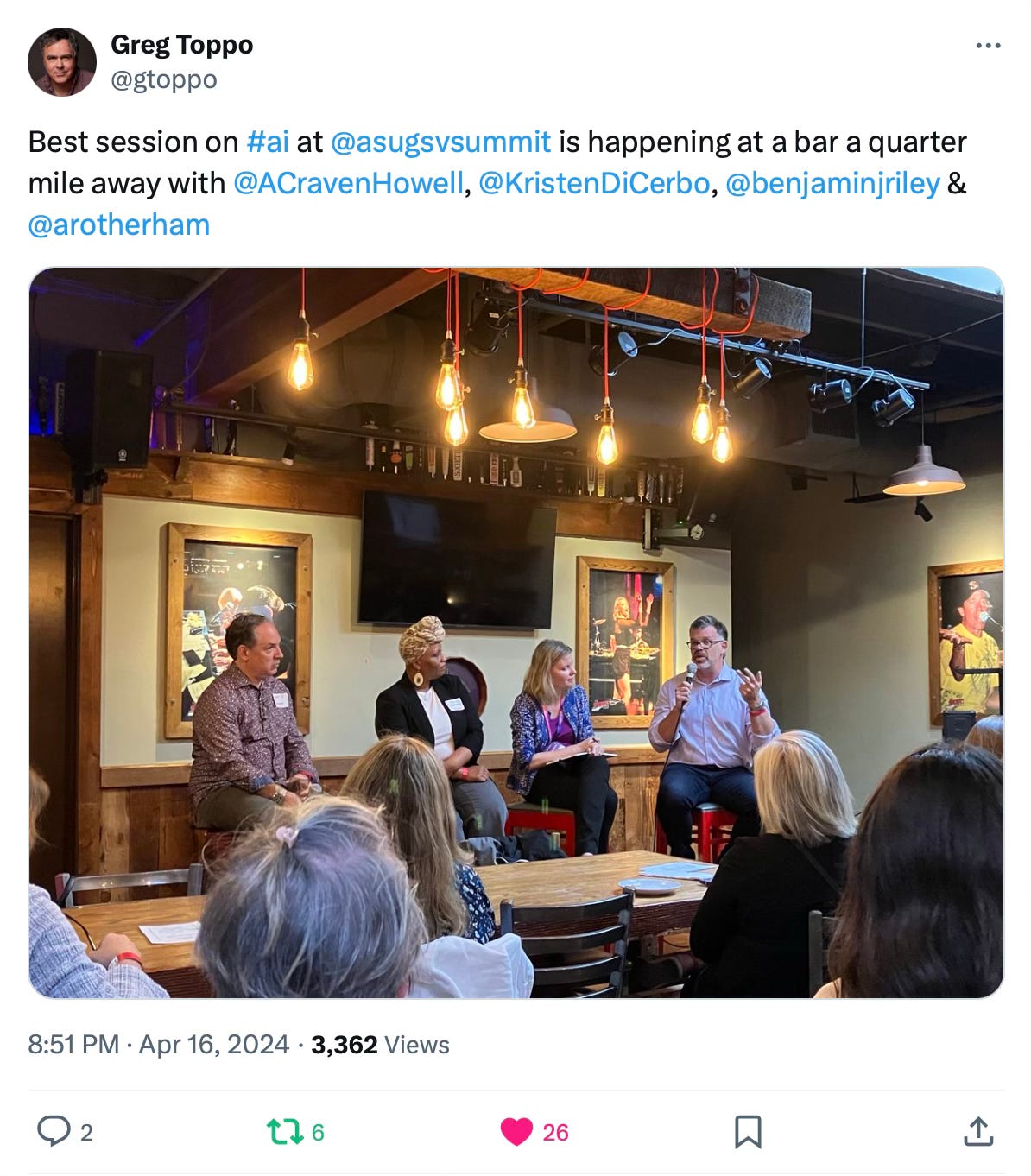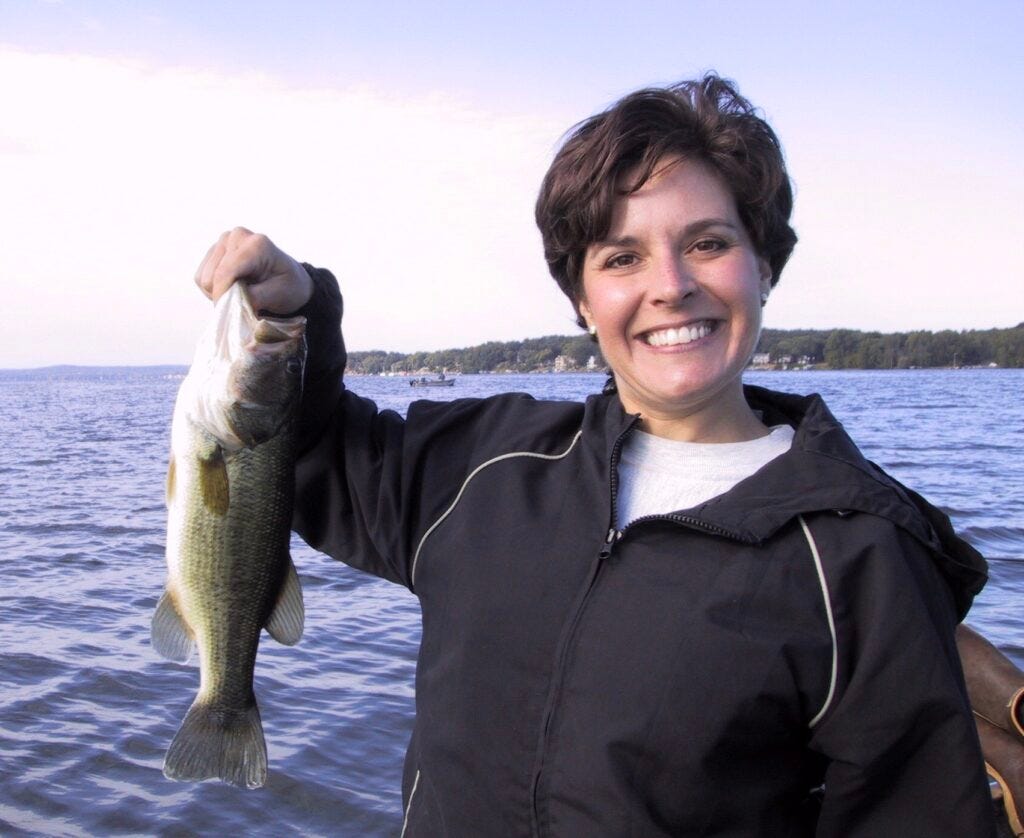Is AI Like The Early Days Of Covid?
Really, what could go wrong?
A few memories stay with me from the very early days of the pandemic. Mostly about what I got wrong or right, or just got lucky.
My wife and I throw themed dinner parties and on Feb. 29th of 2020 we threw a small one with a leap theme, about great leaps. We served grasshoppers among other jumpy food. The attendees included a managing editor at a media outlet, a former secretary of education, an artist friend, non-profit leaders, a FAANG type, that sort of thing. People who were generally connected to information. By that point everyone knew it was bad news, the worst was coming, and part of the conversation tended to, 'probably the last dinner party for a while, enjoy it.' People offered predictions about what was about to happen. I remember one guest saying that a lot of people were about to die, we just didn't know who yet or all the characteristics they might share. It was odd to be talking about that over wine and leap themed dishes as the world sort of ticked on.
That was a Saturday. Early the next week I remember being at the supermarket with my kids. We filled three carts. They thought this was beyond embarrassing. "Everyone is staring at us," one said with dismay because that really is hell on earth for an 8th-grader. They always think everyone is staring at them, in this instance they were right. We were buying a lot of groceries. A week or so later? Well, they they were glad for it.
Here's the thing. We were late to all this and I slept on Covid in its early days, assuming it would be disruptive but more or less like a bad flu year. I chocked some of the more severe reports up to click-hungry media. In February 2020, some schools in Virginia were actually closed because of flu, so episodic not widespread closures wasn't a radical idea. Epidemiologists, though, knew this was not the case. The rest of us not yet. Professionally, I underestimated it in the early going, still wondering if we could pull off a meeting in California in early March or some school visits and spring training in Florida before things had to really close down.
We're not "preppers." I don't have a bunker in my back yard, closest full of ARs, or a year's worth of food. I stockpile bourbon and DVDs of 80s films. Nor am I any more prescient than the next person. But I am connected to pretty good information flow. I have friends in various fields, government, aviation, sports, medicine and, although later than some, once I started paying attention I was able to piece together what was going on and likely to happen. (I was also moonlighting as an EMT doing 911 at the time so though we were basically treated like mushrooms we got some trickle down by early March). By March people I knew were making big financial or logistical moves. A friend who was getting regular non-public briefings told me that first week of March that all the decisions about work, life, travel, that seemed debatable would soon be obvious. It became alarming.
Most of the country was still not yet alarmed.
It seems like the same thing is happening with AI now, albeit in slower motion. To be clear, I don't think AI is simply something to be alarmed about. It's not like Covid. With AI there will be upsides and downsides, as with any novel technology. But, those downsides will be as acute in some cases as the upsides are profound. Adverse consequences are talked about quietly, generally in my experience by elites or those connected to the information flow. 'A lot of people...we just don't know who yet.' (My own hunch is the next recession will create the permission structure for layoffs that are actually AI-related and those jobs will not come back.)
Some people are in the know, some are waking up, some have no idea. In that way it feels a lot like the early days of Covid.
Some people are preparing for those effects more than others. They're counseling their kids. They're thinking about their careers. They're thinking about efficiency and upside as well as risk. Others are unaware and will be buffeted. In our little corner of the world, people talk in hushed tones about what this might mean for education's labor market and various roles wary of causing alarm or setting off political tripwires. In the media world you hear conversations about the serious impacts of AI on how people find and consume news. In elite government circles there is attention being paid.
If you trust tech, trust our tech leaders, think they have everyone's best interests at heart, then rest easy and carry on. If you don't, then something is coming that a small group of people understand - like Covid not fully, but in its broad dimensions - and most people don't. This doesn't mean you should go bury a shipping container in your yard. Or buy guns and antibiotics. (Though I will say those old John Cusack films stand up and you'll want them on hand regardless.) But it does mean leaders should probably do more to ask questions, democratize the flow of information, and help people prepare for opportunity and disruption. Help people understand what's happening and what it might mean - knowing we can't be sure. And be more candid about the potential upsides and downsides. We should do that less in cloistered groups and as much as possible in a more open way around the sector and particularly among its organizing entities - various organizations and associations.
In 2020 we didn't have a leader with the skills and manner to do this for Covid. With AI, in 2024, it's on all of us.
This is an ad (but an important one that might save a life!)
This blog/newsletter is free. But cancer research is not. That's why each summer I ride my bike 192 miles across Massachusetts to raise money for the Dana-Farber Cancer Institute in the Pan Mass Challenge. This year, for a few reasons, I've set a goal of $45,000. That's about 50% higher than past years so I need as much help as I can get to reach it. If you want to learn more or consider donating - 100% of your donation goes to Dana-Farber not overhead and it's tax deductible - you can do both via this link.
From Bellwether
Here's a new analysis on school finance in metro areas. Here's a USAT story by Alia Wong featuring it. And here's a Reason article by Emma Camp doing the same.
Next week I'm participating in this webinar with Aspen about de-polarization and bipartisan policy work. Karen Nussle is a participant too. More on her below.
Nota Bene
Ruy Teixeira is trying to warn you that the election's demographic contours may not be what you think.
Kevin Huffman notes some teacher evaluation noise and signal problems.
Chris Stewart with a reminder that not everything that's a problem can be laid on charters (and also that when it comes to race and education horseshoe politics are a real thing).
Friday Fish Porn
Speaking of Karen Nussle, who is a great person in the sector, here she is with some fish. A largemouth bass and a pike both from the same lake in Wisconsin.
Friday fish what? Yes. Here is a unique archive of hundreds of pictures of education types with fish they've caught. Send me yours!





